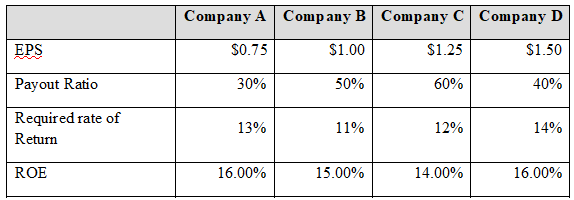What is the difference between the Oral Tradition and the Written or Print Tradition?
What will be an ideal response?
The Oral Tradition consists of cultural messages verbally transmitted across generations while the Written or Print Tradition consists of written communication.
You might also like to view...
The following table contains information about the estimated next year’s EPS, payout ratio, shareholders’ required rate of return, and return on equity of four different companies:

a) Calculate each company’s future earnings growth rate. Using the earnings model, what is the value of the stock?
b) Using the constant-growth dividend discount model, what is the value of the stock?
c) Assume that the companies will experience the growth rate determined in part (a) for a short period of time, and after that the firms will grow at a lower rate. These periods of time and second growth rates are the following:

Using the two-stage dividend growth model, what is the value of the stock? Calculate your solution twice, first using equation 9-5 on page 260, and then using the FAME_TwoStageValue function.
g) Assume that the transition between growth rates 1 and 2 will be gradual rather than instantaneous. The forecasted transition periods are the following:

Using the H model, what is the value of the stock? Calculate your solution twice, first using equation 9-8 on page 264, and then using the FAME_HModelValue user-defined function.
h) Create a Scatter chart to show the relationship between the value of the stock and the dividend payout ratio using Company D. Can you observe any price that is extremely different from the rest? Interpret your results.
Integrated marketing communications is:
a. the use of different promotional tools b. a planned coordinated campaign c. delivery of a clear, consistent message d. for a target audience e. all of the above
The focus of ASC 740 is on the income statement.
Answer the following statement true (T) or false (F)
According to the textbook, the true power of a manager is related to his/her
a. Academic intelligence b. Blood type c. Social intelligence d. Emotional intelligence